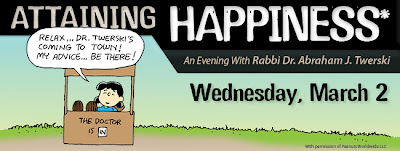Sunday night my wife and I attended a beautiful chassunah in Minneapolis. The chosson was a close family and childhood friend from my hometown of Wichita, KS. The kallah resides in NJ (where they are now living). Aside from meeting a group of the kallah’s friends from NJ, the chosson had family and friends come in from across the county (and E”Y). The mesader kidushin came in from E”Y and is a grandson of Reb Yaakov zt”l (and also a former teacher of mine). Some of his friends were from his summer camp days, others from college, and some were people who he had grown close with on his journey to observant Judaism. In addition to that, my brother was also there. Also I met up with a very old friend who is now very involved in a very important aspect of outreach.
For me, there were a couple of things that stood out from the whole event.
I was asked to be an “aid” (witness) under the chupah, which was humbling, I also ended up meeting a gentleman who is a Rav and originally grew up in London. I asked him (based on the fact that he looked old enough to have grandchildren) if he had ever had any contact with either Rav Dessler zt’l or Rav Lopian zt”l. He told me that as a young boy he met both of these lighthouses of Mussar. He also commented that his his “day” being a “Rav” or Rosh Yeshiva was an earned title of kavod. Unlike today, he told me, when everyone gets called “Rosh Yeshiva” and if you write a sefer or speak somewhere, then you are considered “popular”. He also mentioned that the emphasis on chiztonius is much greater today than when he was growing up.
Dancing was insane. It was the first chassuna I had attended since getting up from aveilus. The fact that it was for a family friend made it even more emotion for me. To dance with the chosson and his family was amazing! Especially since they were not at my own wedding.
For me, there was also an element of introspection (possibly brought on by a few l’chaims, I admit). By default, until recently, I was pretty much the only one from my “generation” and peer group from Wichita that became observant. While I gravitated towards NCSY, the chosson joined Young Judea and was involved with their camps and post-high school programs. While his observance might be viewed as “recent”, it was obvious that there was visible hashgacha pratis involved in every step of his journey. It’s refreshing to see that and usually it’s easier to view Hashem’s involvement with others, than to see Hashem’s hand in our own lives. As I watched him interact with Rabbis he is close with, friends from his past, present, and future I felt a sense of comfort, I guess, in knowing that another Yid has found his place.
In a brief conversation with the old friend who is involved in kiruv, he confirmed something that my wife and I had known for a long time, that my current profession isn’t really where I should be putting my energy into. I’ve know this for a long time, and while I am very thankful that Hashem has given me an opportunity to receive a parnassah, that feeling of fulfillment isn’t really there. You know, I look in the mirror everyday and I see that I don’t have much hair left. It doesn’t bother me that much, because I know that this is just how it is. I will lose more hair and my yarmulka will just get bigger. I deal with it. But when you have someone else point out that you don’t have as much hair as did years ago, then it sort of gets to you. Not in a bad way, but there’s that outside confirmation of what you’ve known for a long time.
To give me even more food for thought, when we boarded the plane (towards the end of our Hebrew anniversary) we found out that we were the only two passengers. Once I got over the feeling of being a rock star, I sat back and thought about the fact that ultimately in my own marriage it’s really just my wife and I alone in the plane that Hashem is piloting. I also thought about something said over in the name of the Alter of Novaradok.
The Alter said that someone not familiar with a Torah lifestyle might look up at a plane flying in the sky and see how small it is. He might even not believe that there could be people living aboard a plane because, to him, it just looks so small. However, once someone has begun to learn Torah and keep mitzvos, he realizes that you can be above the ground and life. You realize that what seemed so small is really quite big and can travel great distances very quickly. I think this applies to myself, as well as the chosson.
 R Micha Berger clued me in that last week Zev Brenner interviewed both R/Dr Abraham Twerksi and also his son Dr Benzion Twerksi. The interview deals with a number of issues within the observant community and solutions. It’s available to listen to or download here.
R Micha Berger clued me in that last week Zev Brenner interviewed both R/Dr Abraham Twerksi and also his son Dr Benzion Twerksi. The interview deals with a number of issues within the observant community and solutions. It’s available to listen to or download here.



